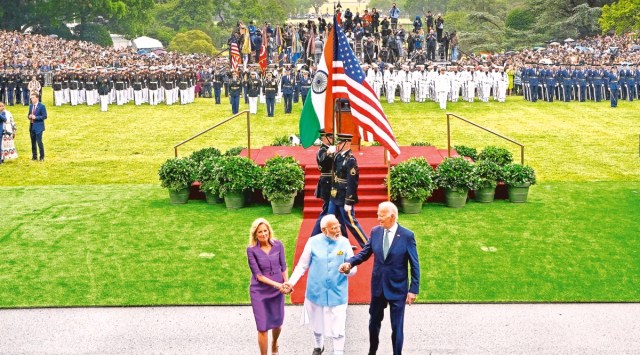Framing his country’s partnership with India among the “most consequential in the world” that is “stronger, closer and more dynamic than any time in history”, US President Joe Biden, who held talks with Prime Minister Narendra Modi Thursday, underlined the new strategic areas of cooperation — from semiconductor supply to sharing critical and emerging technologies, using new ways to diagnose and treat cancer to sending Indian astronauts to space.
Biden by his side in the East Room of the White House, Modi, too, headlined the strategic outcomes in his statement after the bilateral meeting between the two sides.

“Today is a day that has special importance in the history of India-US relations. Our discussions today and the important decisions we have taken have added a new chapter to our comprehensive and a global strategic partnership. They have given it a new direction and a new energy,” he said.
Biden said, “Mr Prime Minister, we met many times over the past few years, most recently in Hiroshima at the G7 Summit, and each time I was struck by our ability to find new areas of cooperation. Together, we are unlocking the shared future of what I believe to be unlimited potential.”
And with this visit, Biden said, “We are demonstrating once more. Indeed, the United States (and India) are collaborating on nearly every human endeavour and delivering progress across the board — from designing new ways to diagnose and treat illnesses, like cancer and diabetes, to collaborating on human spaceflight, including sending in Indian astronauts to the International Space Station in 2024, to accelerate a global clean energy transition and tackling climate climate crisis we face, to harnessing our shared expertise on critical on emerging technologies, like quantum computing and artificial intelligence, to ensuring they are not used as tools of misinformation and oppression.”
“We are doubling down on our cooperation to secure our semiconductors in our semiconductor supply chains, advancing open RAN telecommunications networks, and growing our Major Defence Partnership with more joint exercises, more cooperation between our defence industries, and more consultation and coordination across all domains,” he said.
The two leaders met in the Oval Office for a restricted meeting, which was followed by delegation-level talks.
Story continues below this ad
On defence ties, Modi said, “The close defence cooperation between India and America symbolises mutual trust and shared strategic priorities moving away from the old buyer-seller relationship we had earlier… We have transitioned today to a relationship involving transfer of technology, co-development and co-production.”
“The decision taken by General Electric to manufacture (jet) engines in India through transfer of technology is a landmark agreement. This also opens up new job opportunities in both countries. This will give our defence cooperation a new character in the times to come. The defence industries and startups of both countries are important partners in this cooperation. Bringing them together is the key objective of the defence industrial roadmap,” he said.
The initiative for “critical and emerging technologies”, Modi said, has emerged as an important framework for technical cooperation. “By increasing our cooperation in fields such as artificial intelligence, semiconductors, space, quantum, and telecom, we are creating a strong and futuristic partnership. The decision taken by American companies such as Micron, Google and Applied Materials to invest in India symbolises this futuristic partnership during this journey.”
“We have also decided that in the midst of global uncertainties, India and America will as trusted partners create reliable, secure and resilient global supply chains and value chains as well,” he said.
Story continues below this ad
On space cooperation, Modi said, “We have had long standing cooperation on space… by taking the decision to join the Artemis Accords, we have taken a big leap forward in our space cooperation. In fact, in short, for the India-America Partnership, even the sky is not the limit.”
On global issues, Biden brought up the Russia-Ukraine war as well as the Indo-Pacific.
“Today, we also talked about our shared efforts to mitigate humanitarian tragedies unleashed by Russia’s brutal war in Ukraine and to defend the core principles of the UN Charter, sovereignty and territorial integrity. We discussed our work through the Quad and how India and the United States, together with Australia and Japan, can ensure the vital Indo-Pacific region remains free, open, prosperous and secure through our new I2U2 grouping with Israel and the UAE,” the President said.
The Prime Minister framed the Ukraine conflict in terms of its impact on the developing world: “The Covid pandemic and the Ukraine conflict have afflicted the countries of the Global South in particular. We believe that in order to resolve these problems, it is absolutely imperative for all countries to unite from the very beginning of the events in Ukraine. India has laid emphasis on resolution of disputes through dialogue and diplomacy. We are ready to contribute in any way we can to restore peace.”
Story continues below this ad
On the Indo-Pacific, he said, “In our meeting today, we discussed several regional and global issues. Peace and security in the Indo-Pacific is our common priority. We agreed that the development and success of this region is important for the entire world. We share our views to enhance coordination with all countries in this region along with our Quad partners.”
With hundreds of Indian Americans on the White House lawns to welcome him, he said, “The most important pillar of our relations is our people-to people ties. More than 4 million people of Indian origin today make significant contributions to the progress of America. In fact, just this morning, the large number of Indians that gathered at the White House demonstrates that the Indian Americans, in fact, are the real strength behind our relations in order to further deepen these relations.”
And in this context, he welcomed the US decision to open new consulates in Bengaluru and Ahmedabad. “Similarly, we will also open a new Indian consulate in Seattle,” he said.
After the bilateral meeting, the Prime Minister headed to the US Congress to address the joint session for the second time. Biden said that addressing the joint session for Congress is a “testament to the strong and enduring and thoroughly bipartisan support that exists all across the United States for the friendship and partnership with India”.









